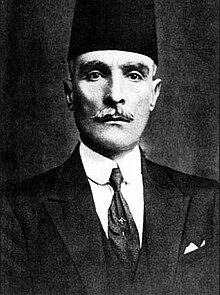Ibrahim Hananu
| Ibrahim Hananu | |
|---|---|

Portrait of Hananu, 1932
|
|
| Born | 1869 Kafr Takharim, Ottoman Syria |
| Died | 1935 Aleppo, Syria |
| Nationality | Syrian |
| Known for | Leader of Hananu Revolt in Aleppo area |
Ibrahim Hananu or Ibrahim Hanano (1869–1935) (Arabic: إبراهيم هنانو) was an Ottoman municipal official and later a leader of a revolt against the French presence in northern Syria. He was an Constantinople-educated member of a notable landholding family of Kurdish origin in northern Syria.
Hananu was born in Kafr Takharim, he was born to a wealthy family of Kurdish ancestry and raised in Aleppo. There was, however, some dispute in his birth date. One source says that he born in 1879, and another source says that he born in 1869. He studied at the Imperial High School in Aleppo and continued his studies at the Ottoman Law Academy of the prestigious Mülkiye school in Constantinople. As a student he joined the Committee of Union and Progress, the political organ that later took the stage following the Young Turk Revolution of 1908.
Upon graduation, Hananu briefly taught at the military academy. Later, he joined the bureaucracy of the Ottoman Empire, only to retire and manage his estates. One Syrian source from the United Arab Republic era indicates that having embraced nationalism when the Arab Revolt broke out in 1916, Hananu joined the Arab army of Faysal I and entered Aleppo with the Allies in 1918. Supposedly, he also joined the secret nationalist society al-Fatat, though there is no corroborating evidence for this. Along with many of the prominent merchants in Aleppo, Hananu became associated with the League of National Defense and the Arab Club of Aleppo.
Particularly following his French mandate authority trial in March 1922, the Muslim elite of Aleppo coalesced around Hananu as a patriotic leader of the Muslim resistance to the French that had occurred with Turkish aid prior to the Franco-Turkish negotiations of 1921. Breaking out in the autumn of 1919 in the countryside surrounding Aleppo, when the French army had landed on the Syrian coast and was preparing to occupy all of Syria, Hanano launched his revolt, bringing Aleppo, Idlib and Antioch into a coordinated campaign against French forces. Hananu was responsible for the disarmament of many French troops, the destruction of railroads and telegraph lines, the sabotage of tanks, and the foiling of French attacks on Aleppo. He received aid from the Turkish nationalist movement of Mustafa Kemal Atatürk, which was battling the French army of the Levant for control of Cilicia and southern Anatolia. With the withdrawal of Turkish military assistance following the signing of the Franklin-Bouillon Agreement in October 1921, Hananu and his men could no longer sustain a revolt, and their struggle collapsed. Despite the failure of the revolt, the organization of the northern areas of Syria with Turkish help has been interpreted as a prototype for self-government that Hananu and other Syrians built upon in later years. Much recent Syrian historiography considers Hananu's rebellion as but the first of a broader series of coordinated revolts, including the Great Revolt of 1925, against the French occupation of the emerging nation state of Syria.
...
Wikipedia
